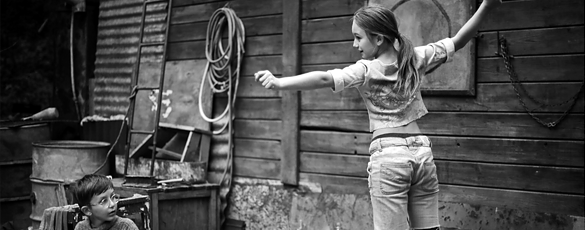Začiatok stránky, titulka:
Pokračovanie obsahu:
Berlinale with Slovak Films
While the burly bear sauntered toward Berlin, representatives of Slovak cinema also headed to the 67th edition of the prestigious Berlin International Film Festival. The drama Little Harbour (Piata loď) by director Iveta Grófová will receive its world première there, Agnieszka Holland’s Spoor (Pokot/Cez kosti mŕtvych), with participation from Slovakia, is in the main competition and the Festival is also showing the Slovak-Czech film A Prominent Patient (Masaryk) directed by Julius Ševčík.

Little Harbour looks at the world of adults through children’s eyes; it will be presented in the Generation Kplus competition focused on children and young people. “We thought about showing the film to children’s audiences from the moment we started developing it. We don’t embellish anything in the film but, at the same time, we aren’t explicit either. We look at the things that happen in the story through the eyes of the child heroes. And the difficulty and cruelty of the situations are mellowed to a certain extent when viewed at that naïve level,” explains Katarína Krnáčová from Hulapa film, the producer of the film. Ten-year-old Jarka is the main character of the drama, based on Monika Kompaníková’s novel. Neglected by her mother, she is desperately looking for love which she finds by chance when she walks away from the train station with a pram with two babies. Together with her friend Kristián, she creates a child family in the garden cottage, hidden from the eyes of adults. “I already thought the story was very powerful when I read the book for the first time. I really liked its atmosphere. After my first fulllength film (Made in Ash/Až do mesta Aš – editor’s note), I wanted to make something visually interesting. And the world of children offers that,” says director Iveta Grófová. According to Krnáčová, presenting Little Harbour at a prestigious festival is a very good start: “There is a huge film market at the Berlinale so, with a view to the film’s potential at other festivals or possible sales to foreign cinema distribution, it is an ideal place to launch a film. I am very happy that we’ve managed to give the film such a chance. And, of course, it is an important source of satisfaction for the three years of work of our entire team.”

The co-production drama Spoor directed by Agnieszka Holland is another film that will receive its world première at the Berlinale, and straight away in the main competition. “Despite entering the project quite late and with the smallest coproduction contribution, our participation is quite marked,” explains Slovak producer Jakub Viktorín from nutprodukcia. “Tomáš Juríček worked on the film as second unit cinematographer, Martin Točka as Steadicam operator, we used shots of wild animals from successful filmmakers from Arolla Film, there was a film crew in Slovakia – the so-called wild unit – that was in charge of shooting the hunts in our territory needed for the atmospheric shots in the film. Recording the film music performed by the Slovak Radio Symphony orchestra was also a very important contribution.” Five countries collaborated on Spoor as co-producers. “It was necessary in order to ensure proper financial, subject- -matter and human resources for the production of the project. On the one hand, it was great that a lot of funds were funnelled into the project but, on the other hand, coordinating all five countries proved quite a complicated business,” clarifies Viktorín. “For my part, I think that the film’s strength lies in the strong, in some ways even provocative, story which raises many questions relating to the current problems of our society. Agnieszka mentions in her interviews that this film could be called ’No Country for Old Women’ which insinuates something about the main character, Janina Duszejko – an outsider who is definitely not one of the quite typical main characters but who, despite this, manages to make you like her. Not to mention that the film non-traditionally merges several genres, hence it also works at a certain experimental level. It manages to not only maintain the suspense from the initial scenes to the closing credits, but also to provide several unexpected surprises for the viewer,” adds Jakub Viktorín.
The Slovak-Czech historical drama A Prominent Patient is to be shown in the Berlinale Special programme section. It returns to the 1930s through the diplomat and Bohemian, Jan Masaryk. The film was directed by Julius Ševčík, with Karel Roden cast in the title role. “The film, set in a period context, revolves around events which substantially influenced the emergence of modern Europe. However, at the same time, it offers a timeless reflection on an individual’s responsibility and his conduct in favour of the state and nation, often at his own cost. Masaryk was a man experiencing a major internal struggle between his sensitive artistic soul and his sense for responsibility and self-sacrifice to the benefit of social targets. And, in this respect, international audiences can also understand it well,” explains producer Rudolf Biermann from IN FILM.
Slovak production is also represented at the Festival by the young animator, Marta Prokopová, who will present her project Wild Beasts (Divoké bytosti) on the Short Film Station 2017 platform within the Berlinale Talents.
During the Festival, Slovak cinema is presented on the Central European Cinema stand which also serves as a meeting point for film professionals. It operates under the aegis of the Slovak Film Institute which has prepared the catalogue of Slovak Films 16 – 17 and an English edition of Film.sk for the Festival.
Zuzana Sotáková
A Prominent Patient. PHOTO: Garfield Film, Little Harbour. PHOTO: Hulapa film